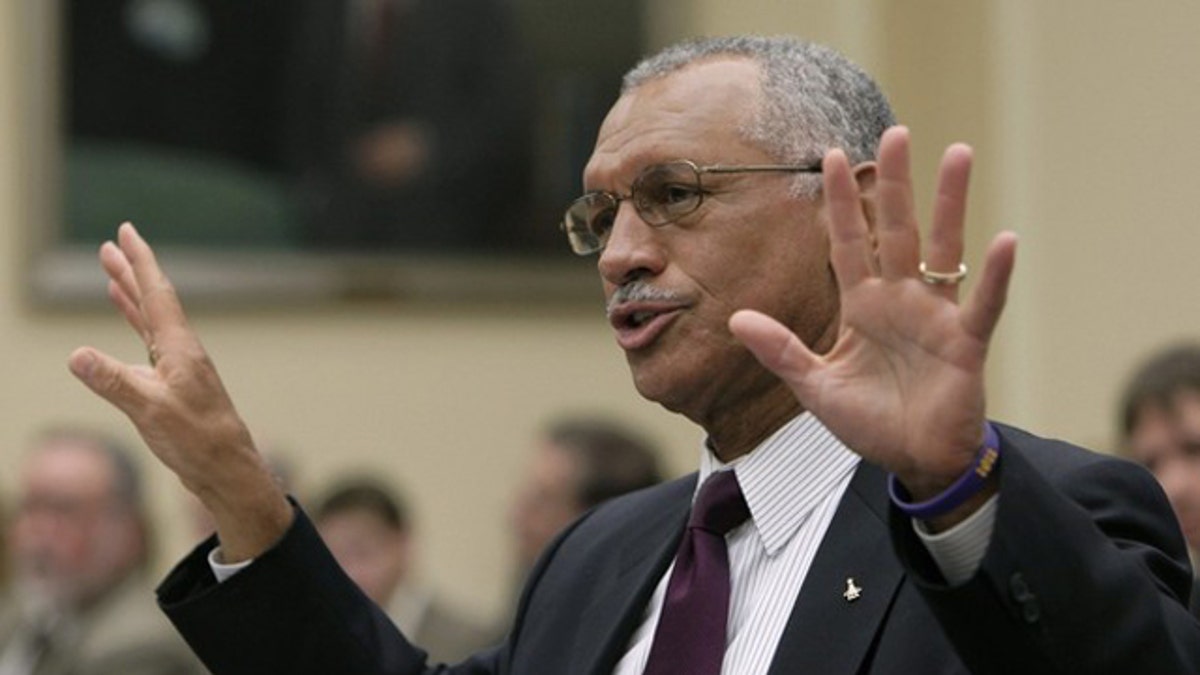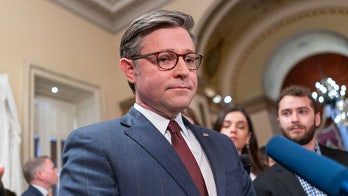
NASA Administrator Charles Bolden testifies before the House Science and Technology committee on Capitol Hill in Washington May 26. (Reuters Photo)
The former head of NASA on Tuesday described as "deeply flawed" the idea that the space exploration agency's priority should be outreach to Muslim countries, after current Administrator Charles Bolden made that assertion in an interview last month.
"NASA ... represents the best of America. Its purpose is not to inspire Muslims or any other cultural entity," Michael Griffin, who served as NASA administrator during the latter half of the Bush administration, told FoxNews.com.
Bolden created a firestorm after telling Al Jazeera last month that President Obama told him before he took the job that he wanted him to do three things: inspire children to learn math and science, expand international relationships and "perhaps foremost, he wanted me to find a way to reach out to the Muslim world and engage much more with dominantly Muslim nations to help them feel good about their historic contribution to science ... and math and engineering."
Officials from the White House and NASA on Tuesday stood by Bolden's statement that part of his mission is to improve relations with Muslim countries -- though NASA backed off the claim that such international diplomacy is Bolden's "foremost" responsibility.
Griffin said Tuesday that collaboration with other countries, including Muslim nations, is welcome and should be encouraged -- but that it would be a mistake to prioritize that over NASA's "fundamental mission" of space exploration.
"If by doing great things, people are inspired, well then that's wonderful," Griffin said. "If you get it in the wrong order ... it becomes an empty shell."
Griffin added: "That is exactly what is in danger of happening."
He also said that while welcome, Muslim-nation cooperation is not vital for U.S. advancements in space exploration.
"There is no technology they have that we need," Griffin said.
The former administrator stressed that any criticism should be directed at Obama, not Bolden, since NASA merely carries out policy.
The White House stood by Bolden on Tuesday. Spokesman Nick Shapiro said in a written statement to FoxNews.com that Obama "wants NASA to engage with the world's best scientists and engineers as we work together to push the boundaries of exploration.
"Meeting that mandate requires NASA to partner with countries around the world like Russia and Japan, as well as collaboration with Israel and with many Muslim-majority countries. The space race began as a global competition, but, today, it is a global collaboration," he said.
Bob Jacobs, NASA's assistant administrator for public affairs, echoed that point. However, he said that Bolden was speaking of priorities when it came to "outreach" and not about NASA's primary missions of "science, aeronautics and space exploration." He said the "core mission" is exploration and that it was unfortunate Bolden's comments are now being viewed through a "partisan prism."
Though the Al Jazeera interview drew widespread attention, it wasn't the first time Bolden made the assertion.
A Feb. 16 blog in the Orlando Sentinel reported that Bolden discussed the outreach during a lecture to engineering students. As he did in the interview with Al Jazeera last month, Bolden was quoted then saying Obama told him to "find ways to reach out to dominantly Muslim countries."
He reportedly talked about the importance of helping countries establish space programs and pointed to the largest Muslim country in the world, Indonesia, as a possible partner.
"We really like Indonesia because the State Department, the Department of Education (and) other agencies in the U.S. are reaching out to Indonesia as the largest Muslim nation in the world," he said.
Bolden did not describe such outreach as his prime mission at the time.
The NASA administrator was in the Middle East last month marking the one-year anniversary since Obama delivered an address to Muslim nations in Cairo. Bolden spoke in June at the American University in Cairo, and in the interview with Al Jazeera he described space travel as an international collaboration of which Muslim nations must be a part.
"It is a matter of trying to reach out and get the best of all worlds, if you will, and there is much to be gained by drawing in the contributions that are possible from the Muslim (nations)," he said.
He held up the International Space Station as a model, praising the contributions there from the Russians and the Chinese.
However, Bolden denied the suggestion that he was on a diplomatic mission. "Not at all. It's not a diplomatic anything," he said.
He also said the United States is not going to travel beyond low-Earth orbit on its own and that no country is going to make it to Mars without international help.
Griffin disputed this point. He said the U.S. can still make those strides without international aid if it wishes, and that, "To the extent that we wish to go to Mars, we can go to Mars."
Griffin said the U.S. should in fact seek international cooperation for those missions, but that it would be "clearly false" to suggest the U.S. needs that cooperation.
Bolden has faced criticism this year for overseeing the cancellation of the agency's Constellation program, which was building new rockets and spaceships capable of returning astronauts to the moon. Stressing the importance of international cooperation in future missions, Bolden told Al Jazeera that the moon, Mars and asteroids are still planned destinations for NASA.
Fox News' Brian Wilson contributed to this report.




